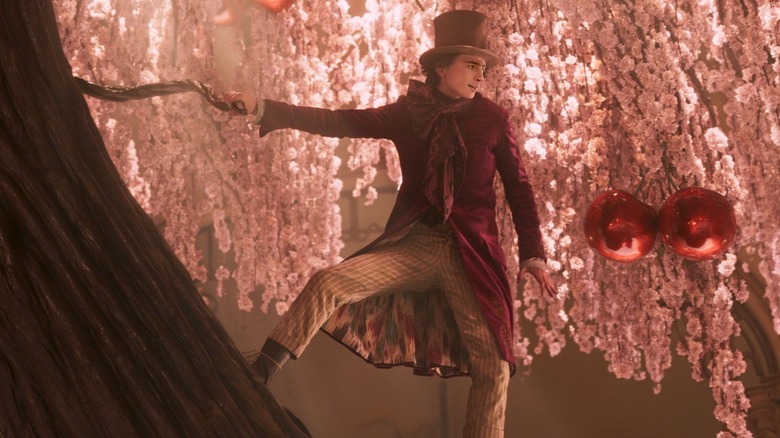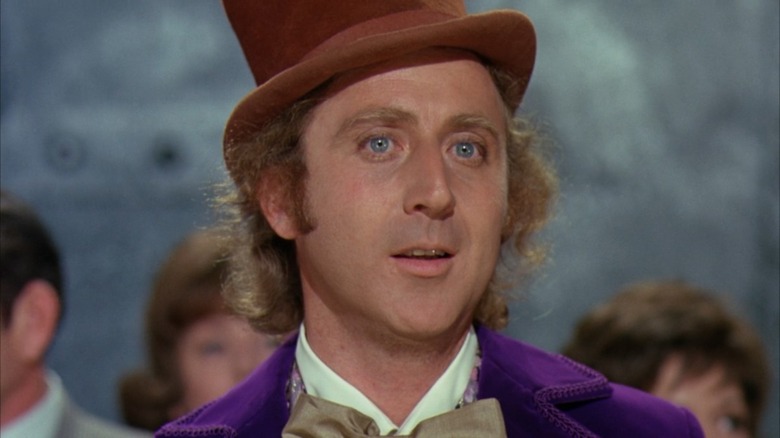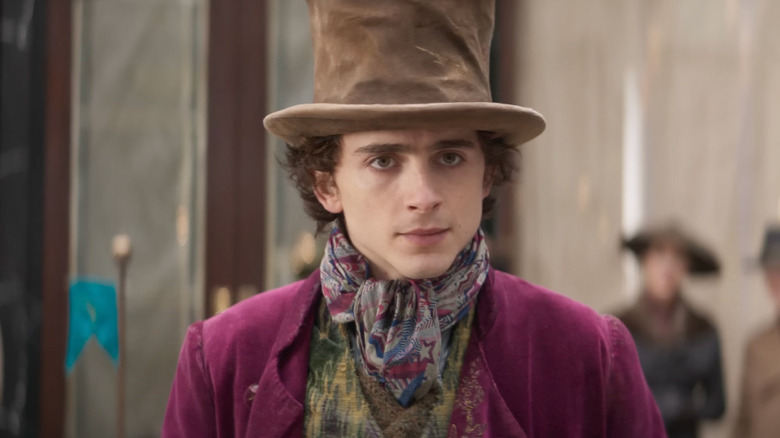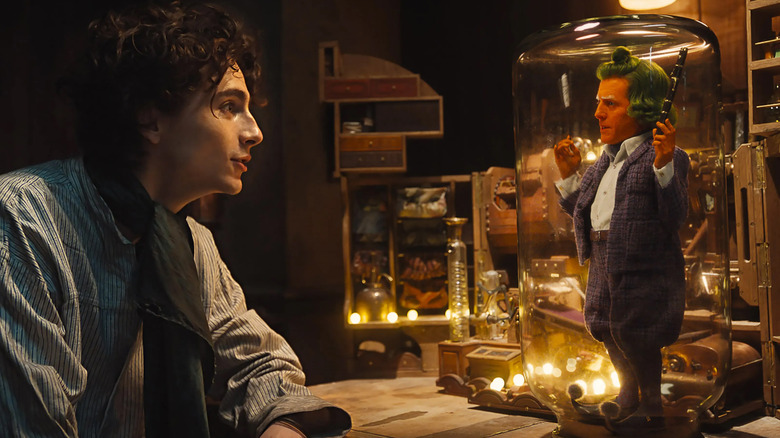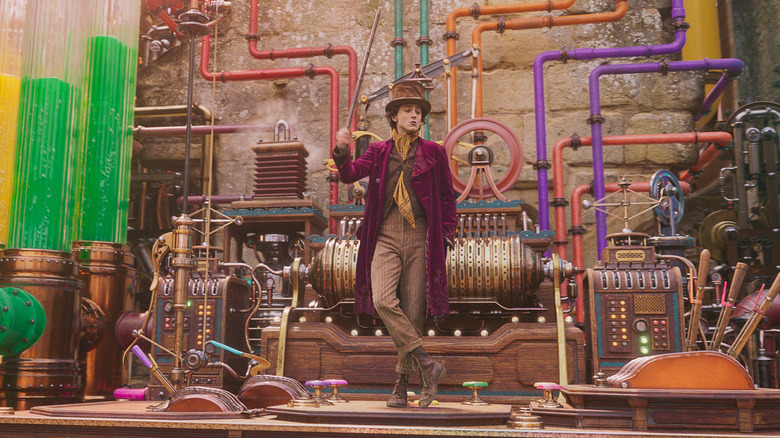Wonka Director Paul King Is Already Working On Ideas For A Chocolatey Sequel
After arriving on the big screen just in time to take advantage of the holiday box office rush last year, "Wonka" is a certified hit. Not only did the movie from "Paddington" director Paul King please critics and audiences alike, but it's raked in over $608 million at the worldwide box office. In fact, it has managed to stay in the top 10 box office chart this whole time. Even as the movie is available on PVOD at home and poised to hit physical media on February 27, "Wonka" is still playing on over 2,300 screens.
Considering the star power of leading man Timothée Chalamet and that kind of financial success, it's likely that a "Wonka" sequel will end up in theaters sometime in the next few years. Though Warner Bros. Pictures hasn't yet announced a follow-up, Paul King is already talking about potential ideas with co-writer Simon Farnaby, so it's only a matter of time before Chalamet gets back in the purple coat and top hat to cook up even more chocolatey goodness.
Leading up to the physical media release of "Wonka" this week, we spoke with director and co-writer Paul King about the chocolatier's origin story and what might be in store for the candy man's future. King confirmed, "I'm sitting with Simon and thinking about Wonka stories, so that's exciting." But first, let's talk about how King views "Wonka" alongside both the "Willy Wonka and the Chocolate Factory" film adaptation from 1971 and Roald Dahl's original "Charlie and the Chocolate Factory" book from 1964, and that might give us some idea of what we can expect in the character's future.
A companion piece
During the press tour leading up to the big screen release of "Wonka," both Paul King and Timothée Chalamet referred to the movie as a companion piece to the 1971 film starring Gene Wilder as Willy Wonka. What exactly does that mean? Does Chalamet's version of Wonka become the version that Gene Wilder played in that movie? King explained a little more clearly:
"I think there are some differences between the Gene Wilder 'Willy Wonka' movie and the book, but not very many. It's obviously an adaptation that Dahl was close to, even though he had a few issues with it. I think because that was my formative thing, I kinda felt there's something canonical about that. There are choices they made, and I didn't want our movie to spoil that movie for generations, I suppose, because it's such an enduring classic. So I felt it would be great if our movie could work as a companion piece, and then ultimately, 20 or 30 years down the line, when the Timothée Chalamet Wonka has grown up, he's closer in tone to Gene Wilder. I don't think either of us was interested in doing an impersonation or something that was exactly that, but something that sat within that universe of Willy Wonka."
So while it's not a direct prequel, they wanted the younger Wonka to feel like he could eventually become Gene Wilder's version of Wonka, if only for the sake of familiarity. After all, it's an origin story for a character millions are familiar with, so we have some idea of where this is headed, even if Chalamet's take ends up going in some different directions. But it's going to take some time to get to the Wonka we all know.
'You've got to go forwards to go back. Better press on'
King acknowledged that the origin story approach gave them a little more free rein to play with the character and provide someone who isn't exactly like the version of Wonka audiences know, because he hasn't experienced some of the darker moments that define his later years. King said:
"It's a very different time in the character's life. Obviously, Willy Wonka becomes this reclusive character, who we know from the book, has sort of retreated behind the walls of the factory and been hurt and damaged in some way by spies and all that, which is kind of the backstory in the book. But this was a period before he's done that. What gave us license to make a movie — hopefully with a satisfying beginning, middle and end — was that we didn't have to end up with him damaged and reclusive, which is hard to feel jubilance about as you leave the movie theater at Christmas, going, 'Wahoo! People get really hurt in this world, mum!' 'Happy Christmas, son!' It didn't seem like the most festive cheer."
That means King was already thinking about filling in the gap between this origin movie and the later version of Willy Wonka that has defined the character for decades. As King explained, "When we started, we were aware that if the movie did well, there could be an appetite for a sequel. It would be very disingenuous to pretend that wasn't a notion. But equally, we wanted to make a movie with a beginning, middle, and end because you've no idea [if you're going to make a sequel]. And I feel this film does sit comfortably. I feel that you go, 'Well, that's its own story, and then when we pick it up later, we're going to learn what happened in the intervening years.'"
So what does that mean for a sequel? Well, there may be hints of possibilities in Dahl's other stories involving Willy Wonka.
Back to Loompaland?
When it comes to the future of Wonka, King says there are a lot of opportunities to explore:
"Dahl wrote loads of stories about Willy Wonka, many of which are in 'Charlie [and the Chocolate Factory],' and many of which aren't. He was a character he kept returning to. So there's definitely room for more Willy Wonka stories. We know he's traveled the world, we know he's been back to Loompaland and met Oompa Loompas, so there's plenty of meat on the bone to explore. I think now that the film has done well, especially, you sort of go, 'I'm sure there will be an appetite to see if we can find a story worth telling.' So for sure, it's something we're thinking about."
There is a sequel book by Roald Dahl called "Charlie and the Great Glass Elevator," but it all takes place after the events of the first book and involves bringing Charlie Bucket into the equation, as well as a trip into outer space. So I can't imagine that King is looking to take inspiration from that for a sequel. However, there are unpublished earlier drafts of "Charlie and the Chocolate Factory" that include extra characters and details about the factory, so maybe those elements could be used to inspire something in the sequel. Beyond that, maybe King has become privy to other unpublished materials that explain more about Wonka's character history
Can Chalamet age into Wonka?
Either way, "Wonka" has proven that King and Farnaby have a good grasp on what defines the chocolatier as a character. Not only did they provide a compelling origin for Wonka, but they surrounded him with an eclectic array of supporting characters to spice things up a bit. Much like "Wonka," without a book for a blueprint, there's endless potential here. And honestly, it wouldn't be terrible if we eventually ended up with a new version of "Charlie and the Chocolate Factory" sometime down the road. It's ripe for a remake, and if it can have some of the heart that made both "Wonka" and the "Paddington" movies work so well, perhaps King can make it work.
However, there's one looming issue with a remake of "Charlie and the Chocolate Factory." Chalamet would probably need to age into that role quite a bit. After all, Wilder was nearly 40 when he played Wonka, and Chalamet looks young even at 28 years old. Sure, they could use makeup or digital effects to age him up a bit, but something about that doesn't feel right. Perhaps King can dig back into his history with "The Mighty Boosh," and Noel Fielding could play an older Willy Wonka? We'll have to wait and see.
"Wonka" is in theaters and available on PVOD now, and it will hit 4K, Blu-ray, and DVD on February 27.
